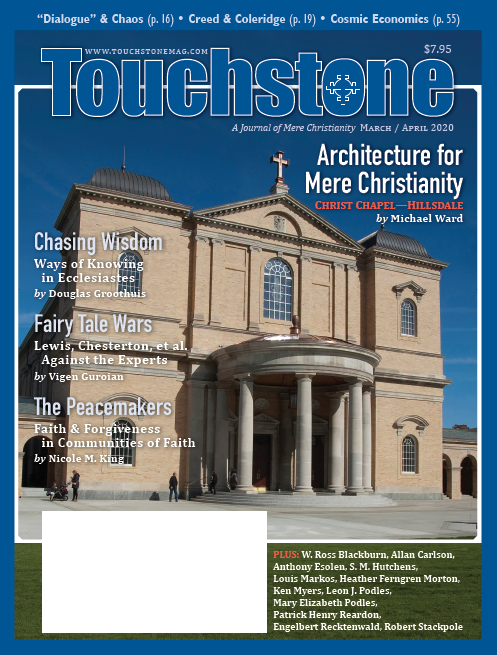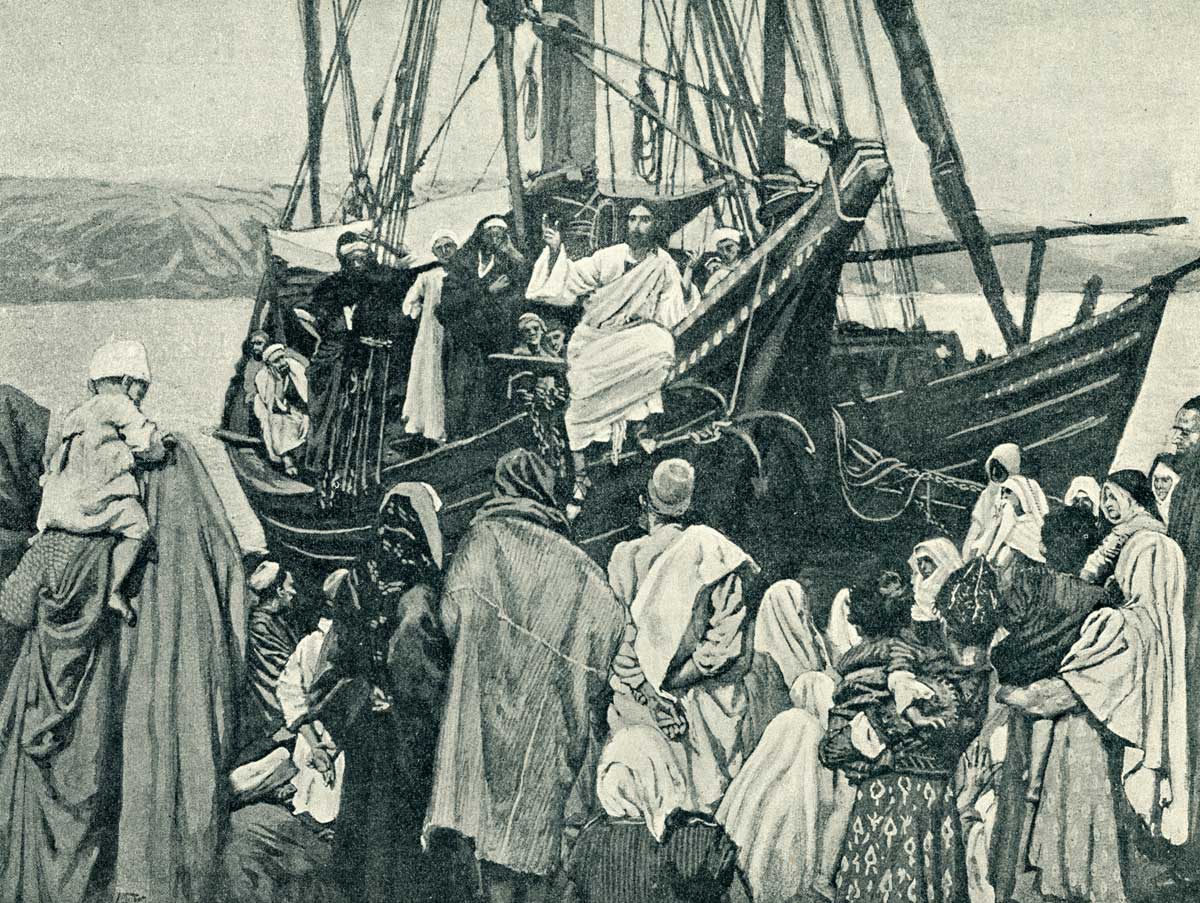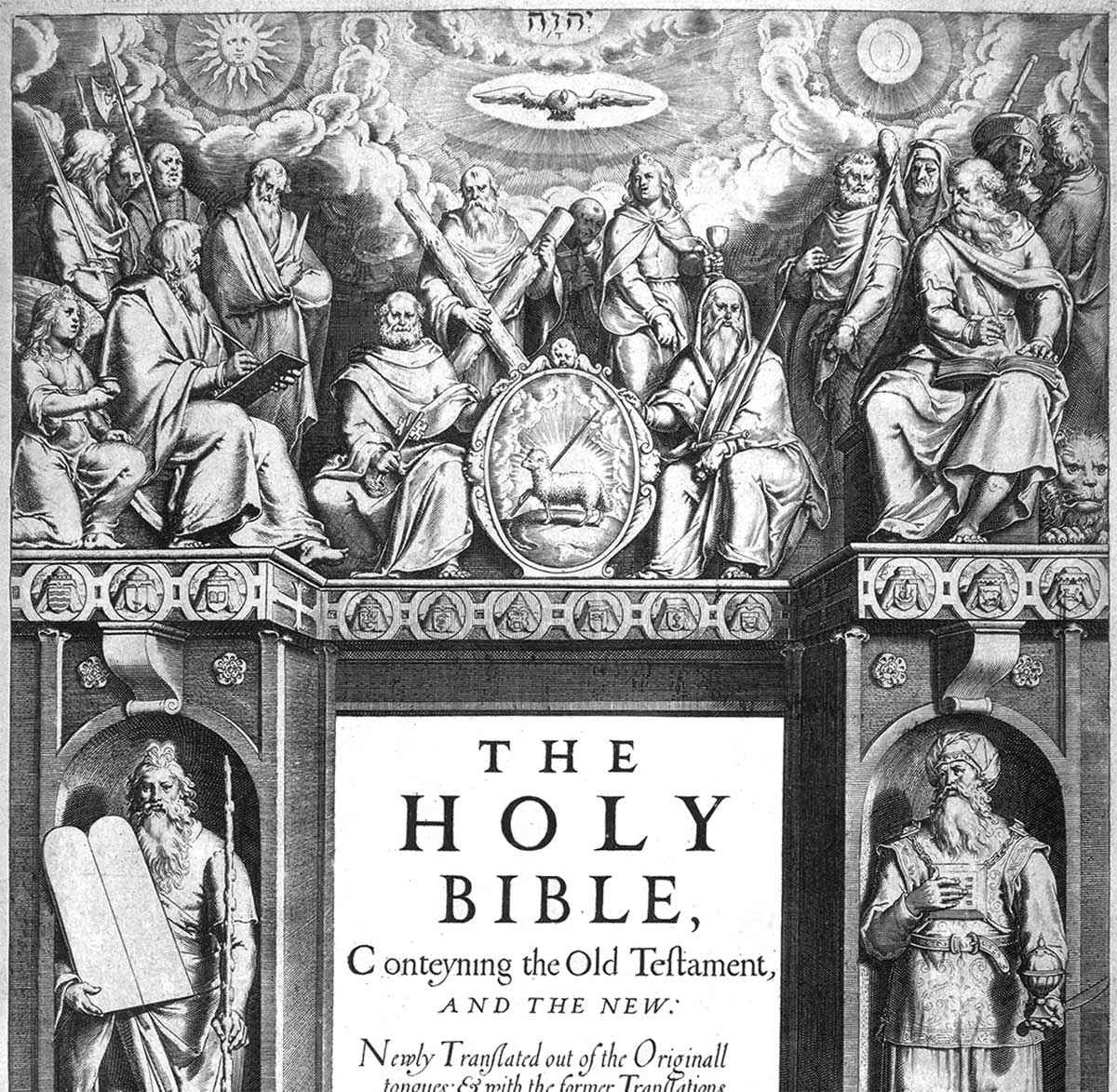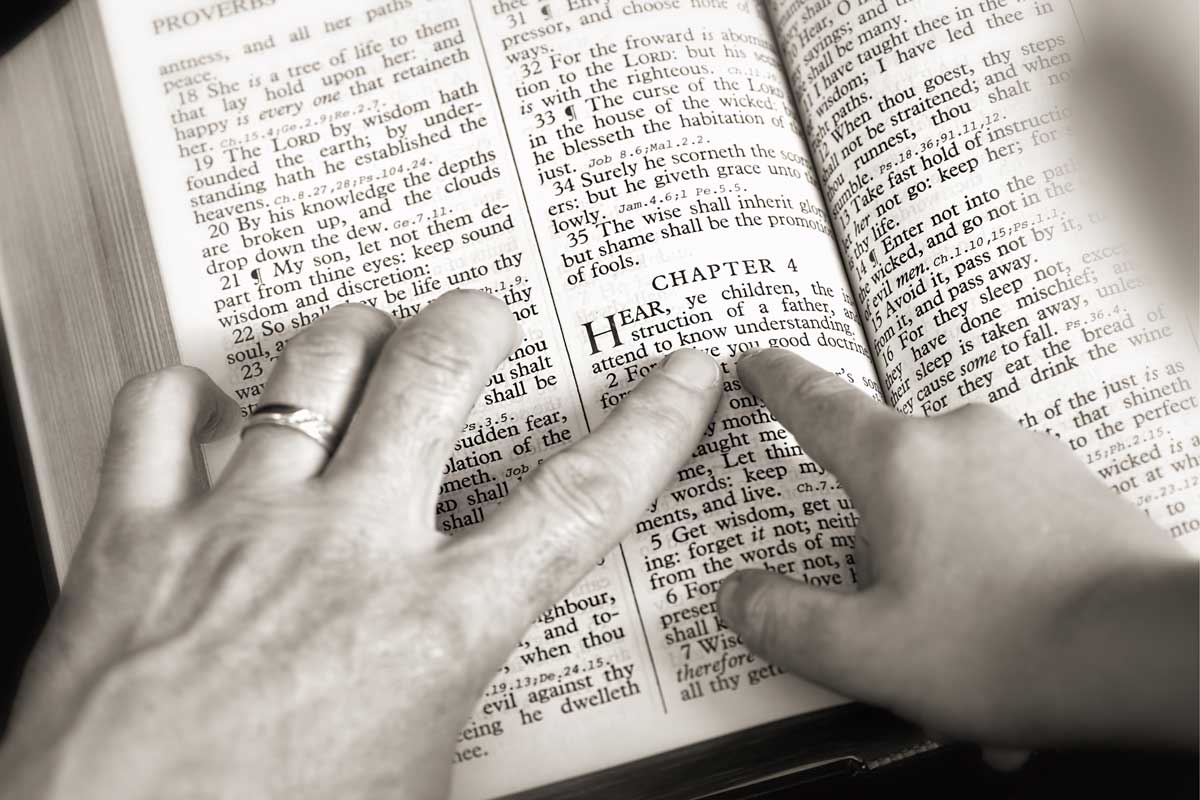Feature
Chasing Wisdom
The True Ways of Knowing in Ecclesiastes
Ecclesiastes has saved my Christian life too many times to count. In the summer of 1999, this sometimes vexing book—perhaps the black sheep of the Christian canon—was the only book of sacred Scripture that I could stand to read. This is not a testimony to my Christian virtue but to the existential and theological power of this piece of wisdom literature. Ecclesiastes offers us an abundance of topics to consider and verses to ponder. For my purposes, I will ask what Ecclesiastes can teach us about epistemology, which is the study of the nature, means, and scope of knowledge.
Epistemology
Epistemology is intrinsic and inexorable in biblical studies, theology, apologetics, ethics, science, and more. For any subject matter, the natural question is, "How do you know that?" Epistemology is our approach to knowing, and it determines our approach to living and our thriving or our dying. If one possesses knowledge on any subject, he possesses a privileged belief that matches objective reality and that is well supported by fact and reasoning.
It was no throwaway line when the Evangelical philosopher Francis Schaeffer wrote, "Unless our epistemology is right, everything is going to be wrong," and this is why he dedicated two chapters to it in his short book, He Is There and He Is Not Silent. One cannot know what is false, but one can believe what is false. However, one may come to a true belief that does not attain knowledge. As T. S. Eliot wrote in Murder in the Cathedral, "The last act is the greatest treason. To do the right deed for the wrong reason." Mutatis mutandis, we can affirm that "believing the right thing for the wrong reason" is equally treasonous to reality.
Developing Our Ability to Know
But the knowledge of many things "under the sun" (a phrase so often used in Ecclesiastes) does not come easily. Rather, knowledge often requires an accurate assessment of one's ability to know, the standards for knowledge, and a fine focus on the things worth knowing. These concerns are axiological: they require a sense of objective value related to cognition and intellectual habits. Christians are called to cognitive rectitude before reality—divine, human, and creational factuality. The Bible in general, and Ecclesiastes in particular, emphasizes what philosophers call virtue epistemology, which, according to The Cambridge Dictionary of Philosophy, is a "subfield of epistemology that takes epistemic virtues to be central to understanding justification or knowledge or both. An epistemic virtue is a personal quality conducive to the discovery of truth, the avoidance of error, or some other intellectually valuable goal."
The writer of Hebrews upbraided his readers for not discharging their God-given powers of reason and sensibility in this way:
We have much to say about this, but it is hard to make it clear to you because you no longer try to understand. In fact, though by this time you ought to be teachers, you need someone to teach you the elementary truths of God's word all over again. You need milk, not solid food! . . . But solid food is for the mature, who by constant use have trained themselves to distinguish good from evil. (Heb. 5:11–14)
The writer teaches that habitual patterns of moral discernment are required for higher-level teaching. One must build from a firm foundation, and that foundation must be secured through godly habits of knowing—otherwise, it may be lost.
One could go on, but suffice it to say that God's revelation gives us knowledge we could not have otherwise and, through its wise counsel, orients our own knowing in ways conducive to virtuous intellectual comportment. This is a huge theme needing systematic exposition. However, I will only address the epistemological themes I find in Ecclesiastes.
Epistemology in Ecclesiastes: Preliminaries
I leave to the technical scholars to decide who wrote Ecclesiastes and when it was written. However that shakes down, I take Ecclesiastes to be a part of Holy Scripture and therefore to be authoritative and without error when rightly interpreted. As such, it does not contain contradictions. Nor does it include a later editor who corrected Qohelet (whom I will call the Teacher). The distinction between the Teacher and the writer of Ecclesiastes makes sense, but I do not insist on it.
But no matter; this does not undermine the coherence, orthodoxy, or edifying nature of the book. I take a maximalist view of the text: we should extract as much meaning as possible from it and not place ourselves above it by applying modern sensibilities or even certain scholarly conventions. The entire book of Ecclesiastes is Holy Scripture. What Paul affirmed to Timothy applies to Ecclesiastes and the entire Hebrew Bible: "All Scripture is God-breathed and is useful for teaching, rebuking, correcting, and training in righteousness, so that the servant of God may be thoroughly equipped for every good work" (2 Tim. 3:14–17).
One pivotal hermeneutical decision affects my understanding of the book. Unlike many interpreters, I do not think that Ecclesiastes gives us two views of life: one that is secular and without God and that is denoted by the phrase "under the sun," and another that is God-oriented and that rescues us from the grim observations of life "under the sun." No, "under the sun" means earthly existence as it is for everyone. Ecclesiastes, rather, teaches us how to live wisely in a fallen world that is still God's world.
I approach the exciting but daunting task of this essay not as a Hebrew scholar, but as a Christian philosopher who reads Scripture with philosophical questions in mind. Ecclesiastes is wiser than anything I could say about it. Yet it needs careful handling, like a fine glass mobile whose parts are well-integrated, but easily jumbled or even broken.
Seeking Wisdom
How to seek wisdom is, I claim, the central theme of Ecclesiastes. The Teacher earnestly pursues knowledge concerning the meaning of life, the significance of nature, and human activities in light of wealth, sensual enjoyment, time, fatigue, injustice, aging, and death. He does so not as a detached observer or as a recipient of a divine vision, but as an aged but ardent inquirer, who is leaving his wisdom to those younger than he (in typical wisdom literature fashion). He relates his story and conclusions after an auspicious, daunting, and even deterrent introduction:
The words of the Teacher, son of David, king in Jerusalem:
"Meaningless! Meaningless!"
says the Teacher.
"Utterly meaningless!
Everything is meaningless." (Eccl. 1:1–2)
The NIV's rendering of hebel as meaningless is unsatisfactory, as is the poetic King James's "Vanity of vanities, all is vanity." Whatever hebel means, the writer's repetition indicates a superlative. Given the rest of the book, and the lexical possibilities, it seems that hebel is better taken as breath or air in the sense of vapor or mist. As The Jewish Study Bible says, it is something insubstantial and refers to "actions and work that do not last, or appear to lead to no lasting goal, or cannot be explained in any rational, i.e., human way."
Hebel does not mean absurd, since the Teacher, despite his perplexity and even cynicism, entrusts all things to God, who knows all and who will bring everything into account. The vapor evaporates; it is ephemeral; it is not absurd or meaningless in the sense taken by atheistic existentialism or nihilism. The Teacher uses this phrase or the word hebel by itself 38 times; it punctuates and organizes his diverse reflections (see 2:15,17,19,21,23,26; 3:19, etc.). In some cases, the phrase, "a chasing after wind," is either added or stands alone. This phrase appears nine times and further strengthens the point.
The Bible speaks of the ephemerality of life loudly and frequently. Consider the only Psalm of Moses, the man of God:
Yet you sweep people away in the sleep of death—
they are like the new grass of the morning:
In the morning it springs up new,
but by evening it is dry and withered. (Ps. 90:5–6)
Near the end of Ecclesiastes, the Teacher returns to his lament:
"Meaningless! Meaningless!" says the Teacher.
"Everything is meaningless!" (12:8)
Ardor for Knowledge
Yet the Teacher seeks wisdom even in the midst of a vaporous existence. If he meant that life was absurd, lacking any objective meaning, his counsel would be pointless, as would the very writing of the book. But he says:
I, the Teacher, was king over Israel in Jerusalem. I applied my mind to study and to explore by wisdom all that is done under the heavens. What a heavy burden God has laid on mankind! (1:12–13)
I said to myself, "Look, I have increased in wisdom more than anyone who has ruled over Jerusalem before me; I have experienced much of wisdom and knowledge." Then I applied myself to the understanding of wisdom, and also of madness and folly, but I learned that this, too, is a chasing after the wind. (1:16–17)
Near the end of Ecclesiastes, either the Teacher or the narrator gives the lead actor of the book high praise: "Not only was the Teacher wise, but he also imparted knowledge to the people. He pondered and searched out and set in order many proverbs. The Teacher searched to find just the right words, and what he wrote was upright and true" (12:9–10).
Here is the first lesson for epistemology: The Teacher applied his mind, he experienced wisdom and knowledge, but this was a chasing after wind. However, the book does not end here. There must be some worth in chasing after wind—at least in the manner of the Teacher. He takes us on a journey for knowledge and wisdom as he recounts his sojourn into darkness and light. After surveying more vexation under the sun, the Teacher writes: "All this I saw, as I applied my mind to everything done under the sun" (8:9).
This search was deeply experiential. The Teacher not only observes but also responds to what he observes emotionally, sometimes quite viscerally:
So I hated life, because the work that is done under the sun was grievous to me. All of it is meaningless, a chasing after the wind. I hated all the things I had toiled for under the sun, because I must leave them to the one who comes after me. (2:17–18)
Life, from one angle, is hateful, because good things don't last and bad things last longer than they should. One's earnest toil is left to another, who may even misuse it. The Teacher knows this and feels this. Yet the pain does not throw him off the scent of pursuing knowledge and wisdom. He works through pain in his arduous epistemic pursuit, thus evincing the intellectual virtues of tenacity and studiousness.
After writing the lyrical verses in chapter three about there being a "time for every season under heaven," the Teacher still laments life, but intimates something more:
What do workers gain from their toil? I have seen the burden God has laid on the human race. He has made everything beautiful in its time. He has also set eternity in the human heart; yet no one can fathom what God has done from beginning to end. (3:9–11)
It seems that "eternity in the human heart" is the fuel for the human engine that seeks knowledge even in the world of mystifying mist. As Michael Eaton has written:
The eternity of God's dealings with mankind corresponds to something inside us: we have a capacity for eternal things, are concerned about the future, want to understand "from the beginning to the end" and have a sense of something which transcends our immediate situation.
Despite this "eternity in the human heart," the Teacher goes on to write, "no one can fathom what God has done from beginning to end" (3:11). Within this tension (which is not a contradiction), the quest for knowledge is played out.
The Teacher never gives up his quest, although he speaks of its difficulty early on in the book. "All things are wearisome, more than one can say. The eye never has enough of seeing, nor the ear its fill of hearing" (1:8).
Discerning the Limits of Knowledge
A central thesis of Ecclesiastes is that the wise person, unlike the fool, will seek knowledge, but will also recognize the limitations put on human knowers. Chapter seven speaks often of what cannot "be found out." Even after such an ardent search for knowledge, the Teacher confesses:
When I applied my mind to know wisdom and to observe the labor that is done on earth—people getting no sleep day or night—then I saw all that God has done. No one can comprehend what goes on under the sun. Despite all their efforts to search it out, no one can discover its meaning. Even if the wise claim they know, they cannot really comprehend it. (8:16–17)
Lest we judge that his confession is apropos only in the Old Testament, before the glory of Christ was revealed, consider the declaration of the Apostle Paul, which he made after writing the most systematic exposition of Christian theology in Scripture:
Oh, the depth of the riches of the wisdom and knowledge of God!
How unsearchable his judgments,
and his paths beyond tracing out!
"Who has known the mind of the Lord?
Or who has been his counselor?"
"Who has ever given to God,
that God should repay him?"
For from him and through him and for him are all things.
To him be the glory forever! Amen. (Rom. 11:33–36)
Paul places his confession of ignorance in the context of praise and doxology, unlike the poor Teacher. However, the messages overlap at one key point. God has put strict limits on our knowledge of himself and his governance of the world. But this is no reason to forsake knowledge and instruction. Rather, we should redouble our efforts to know what can be known, given the shortness of life and the importance of wisdom.
Quiet Knowing
Although he does not develop it at length, Qohelet advises quiet over noise and reticence over loquaciousness in these three passages:
Better one handful with tranquility
than two handfuls with toil
and chasing after the wind. (4:6)
The quiet words of the wise are more to be heeded than the shouts of a ruler of fools. (9:17)
The more the words, the less the meaning, and how does that profit anyone? (6:11)
In this spirit, Søren Kierkegaard wrote of the epistemic value of silence for understanding the gospel message:
In observing the present state of affairs and of life in general, from a Christian point of view one would have to say: It is a disease. And if I were a physician and someone asked me, "What do you think should be done?" I would answer, "Create silence, bring about silence." God's Word cannot be heard, and if in order to be heard in the hullabaloo it must be shouted deafeningly with noisy means, then it is not God's Word; create silence!
And we humans, we clever fellows, seem to have become sleepless in order to invent every new means to increase noise, to spread noise and insignificance with the greatest possible ease and on the greatest possible scale. Yes, everything has been turned upside down. The means of communication have been perfected, but what is publicized with such hot haste is rubbish. Oh, create silence!
Ignorance Within a Framework of Knowledge
But however limited we are "under the sun," no matter how much we "chase after the wind," our ignorance can be placed into a framework of knowledge. This knowledge consists of three main categories.
First, we can know the superiority of wisdom to foolishness (or wickedness), whatever the outcome of the sage or the fool. In the sense that all die, the wise person is not better off than the fool: "In this meaningless life of mine I have seen both of these: the righteous perishing in their righteousness, and the wicked living long in their wickedness" (7:15).
But wisdom is an intrinsic good and often results in extrinsic good:
I saw that wisdom is better than folly, just as light is better than darkness. (2:13)
Wisdom, like an inheritance, is a good thing
and benefits those who see the sun.
Wisdom is a shelter
as money is a shelter,
but the advantage of knowledge is this:
Wisdom preserves those who have it. (7:11–12)
Therefore, we should seek wisdom passionately.
Second, the Teacher (or the writer) knows that God is sovereign in all things and that he will bring everything into account. Therefore, we should fear him and keep his commandments, however obscure his ways appear to us:
Now all has been heard;
here is the conclusion of the matter:
Fear God and keep his commandments,
for this is the duty of all mankind.
For God will bring every deed into judgment,
including every hidden thing,
whether it is good or evil. (12:13–14)
Third, one should be aware that there is a time to stop seeking knowledge and simply enjoy life:
This is what I have observed to be good: that it is appropriate for a person to eat, to drink and to find satisfaction in his toilsome labor under the sun during the few days of life God has given him—for this is his lot. Moreover, when God gives someone wealth and possessions, and the ability to enjoy them, to accept his lot and be happy in his toil—this is a gift of God. He seldom reflects on the days of his life, because God keeps him occupied with gladness of heart. (5:18–20)
The Teacher led us on his quest for wisdom through nature, culture, wealth, and sensual enjoyment. He came up short. However, he knows that the gifts of God should be enjoyed. And without such holy recreation, the quest for knowledge becomes overwhelming and dispiriting. We may give up, crack up, or blow up.
The Conclusion of the Matter
So much more could and should be explored about the epistemology of Ecclesiastes, particularly the meaning of sorrow in knowing (7:1–6). I will offer one application from the Teacher's approach to life and knowledge. It is this: the Christian, who has access to more knowledge than the Teacher, still needs to place his ignorance of life under the sun within a framework of knowledge that God has revealed and which can be defended through Christian apologetics.
Many evils are inexplicable to us—to us citizens of this vaporous world. However, given our knowledge of God's grand narrative, we know that these evils are not meaningless. God is sovereignly crafting them to achieve a greater good that would not be achieved otherwise (Gen. 50:20).
I recently made this distinction to a friend suffering through the loneliness and betrayal of divorce, who is finishing his doctorate in theology. It gave him a new way to work through his own suffering, a way based on an ancient understanding of finding knowledge and wisdom under the sun.
Douglas Groothuis is Professor of Philosophy at Denver Seminary and the author of twelve books, including Christian Apologetics (InterVarsity, 2011), Philosophy in Seven Sentences (InterVarsity, 2016), and Walking Through Twilight: A Wife's Illness—A Philosopher's Lament (InterVarsity, 2017), in addition to over thirty academic papers.
subscription options
Order
Print/Online Subscription

Get six issues (one year) of Touchstone PLUS full online access including pdf downloads for only $39.95. That's only $3.34 per month!
Order
Online Only
Subscription

Get a one-year full-access subscription to the Touchstone online archives for only $19.95. That's only $1.66 per month!
bulk subscriptions
Order Touchstone subscriptions in bulk and save $10 per sub! Each subscription includes 6 issues of Touchstone plus full online access to touchstonemag.com—including archives, videos, and pdf downloads of recent issues for only $29.95 each! Great for churches or study groups.
Transactions will be processed on a secure server.
more on bible from the online archives
more from the online archives
calling all readers
Please Donate
"There are magazines worth reading but few worth saving . . . Touchstone is just such a magazine."
—Alice von Hildebrand
"Here we do not concede one square millimeter of territory to falsehood, folly, contemporary sentimentality, or fashion. We speak the truth, and let God be our judge. . . . Touchstone is the one committedly Christian conservative journal."
—Anthony Esolen, Touchstone senior editor













